Making sure your child is on track for success is as easy as remembering this simple phrase: screen early, screen often. A screening observes how your child is growing to ensure he/she is meeting expected milestones. Participating in a screening can help guarantee that your child will not fall behind because of a developmental delay. Below are the general categories that early childhood professionals and pediatricians check to ensure a child is on track for success. If you would like to schedule your child for a developmental screen, please click here.

Physical Development
During their first five years, young children undergo more rapid and dramatic changes in their physical development than at any other time in their lives. Changes in body proportion, coordination, and strength occur, as does increasingly complex brain development. Children develop remarkable physical, motor, and sensory capacities that enhance exploration and mastery of the environment.
• Health and Wellbeing
• Motor Development
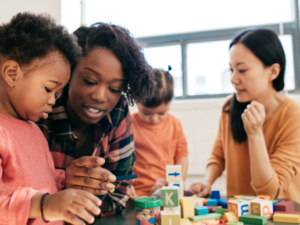
Approaches to Learning
Approaches to Learning is a unique and critical domain of children’s development. Although each of the other domains of development reflects specific content knowledge that document what children know and do, Approaches to Learning is not about specific content knowledge. Instead, it addresses how children deal with new environments, interactions, and discoveries. Approaches to Learning describes children’s attitudes and dispositions toward learning.
• Eagerness and Curiosity
• Persistence
• Creativity and Inventiveness
• Planning and Reflection
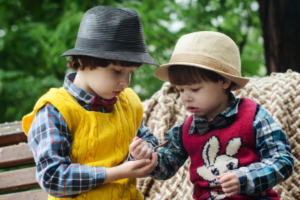
Social and Emotional Development
As children grow, their ability to establish relationships with peers and with additional adults influences how they view themselves and the world. Positive and adaptive social behaviors result from interacting with others who have different characteristics and backgrounds. With the help of supportive adults, young children expand their capacities to recognize and express their own feelings, and to understand and respond to the emotions of others.
• Emotional Functioning
• Managing Emotions
• Building and Maintaining Relationships with Adults and Peers
• Sense of Identity and Belonging
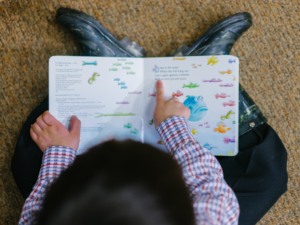
Language and Literacy
Language, communication, and early literacy and writing are critical to children’s ability to learn, work, and play with others. Language and literacy development involves the way children learn to communicate with sounds, words and gestures, and eventually, the way they learn to read and write. Children develop language and literacy through interactions with adults and other children, engagement with materials and instructional experiences.
• Listening and Understanding
• Speaking
• Vocabulary
• Sentences and structure
• Conversation
• Emergent Reading
• Emergent Writing
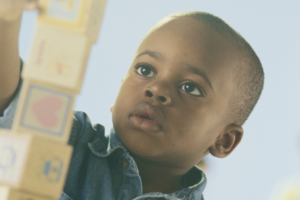
Mathematical Thinking
Mathematics is everywhere and it helps children make sense of their world. Children learn by observing and interacting with their environment and are naturally curious about number and mathematical concepts. Children’s development of mathematical understanding begins in the very first months of life and continues to grow and expand as they interact with others and with the world around them. For young children, math is about number knowledge, patterns, size, shape awareness, and the relationship between objects and space.
• Number Sense
• Number and Operations
• Patterns
• Geometry
• Spatial Relations
• Measurement and Data
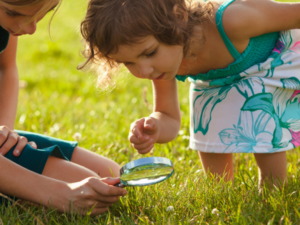
Scientific Inquiry
Scientific inquiry addresses children exploring the world around them. Children are natural investigators and their levels of understanding deepen over time with varied experiences. Exploration and discovery are ways that young children learn about their worlds by first using their senses and reflexes. The initial spontaneous responses of infants become more purposeful as they gain mobility. The expanding physical and motor capacities of toddlers enable them to engage in ever-widening explorations which can promote new brain connections.
- Scientific Inquiry through Exploration and Discovery
- Life Science
- Physical Science
- Earth and Space Science
- Environment
- Engineering and Technology

Social Studies
In the earliest years, social studies concepts simply involve children exploring their world and trying to make sense of the social and physical environments. Social interactions form the basis of social studies, therefore in the early childhood arena, each child’s basic social understanding begins with self and family then expands to early education. A sensitive, respectful approach sets the tone for a child’s social learning.
• Culture
• Individual Development and Identity
• Individuals and Groups
• Spaces, Places and Environments
• Time, Continuity, and Change
• Governance, Civic Ideals and Practices
• Economics and Resources
• Technology and Our World
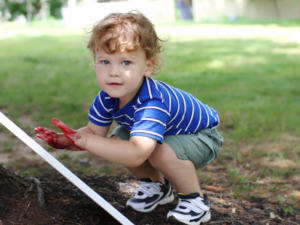
Creative Expression Through the Arts
Creative Expression Through the Arts, provides children with opportunities to express ideas and feelings, use words, manipulate tools and media, and solve problems Through the arts, children learn to express what they know, pursue their own interests and abilities and appreciate the contributions of others. They begin to understand that others can be creative in different ways and show appreciation for these differences by asking questions and commenting.
• Sensory Art Experience
• Music
• Creative Movement
• Imaginative and Creative Play
• Appreciation of the Arts
Back to Top
Developmental Screenings are in essence check-ups for your child that goes beyond just their physical health an growth. Screenings are a tool to observe how your child changes over time and to ensure your child meets the typical developmental milestones in playing, learning, speaking, behaving, and moving. Screenings are important to keep your child on track for success. Screening can help your doctor determine if a child has a delay in growth or development. Participating in screening can help guarantee that your child will not fall behind because of a developmental delay.
There are multiple sources in the community where you can access a free, developmental screening for your child, starting with your child’s pediatrician. See below.

Community Screening Resources
Help Me Grow
Help Me Grow promotes early identification of developmental, behavioral or educational concerns, then links children and families to community-based services and supports at no cost to parents and caregivers. Access free developmental and behavioral screenings and connect to resources you need to succeed.
First Words/Baby Navigator
When you join Baby Navigator you will be invited to complete the Social Communication CheckUp every 3 months, starting when your baby is 9 months, until your baby’s 2nd birthday at 24 months.
Leon County Schools
Any child entering a Leon County Schools Pre-K/VPK program MUST complete the Early Childhood Programs Screening process. DO NOT register the child at the school. Once the Screening process is complete, we will notify you and the school of next steps needed. This process may take several weeks to complete.
Whole Child Leon
Every Spring and Fall, Whole Child works with multiple agencies to host a comprehensive early childhood screening day giving parents a one-stop shop to not only screen their child for every major milestone but also connect with resources available in the community on the same day.
Early Learning Coalition
The Early Learning Coalition of the Big Bend Region, Inc. (ELCBB) offers ASQ-3 developmental screenings for children two months to five years of age to identify possible delays in a child’s development. The ELCBB knows how critical the first five years of life are and the sooner the ELCBB identifies a delay or disability, the sooner we can help connect children with needed services and supports.
FDLRS/Child Find
Child Find Specialists in each school district provide free screenings that examines your child’s hearing, vision, cognitive, social, language and motor development. Based on screening results, your child may receive more in-depth evaluations to assist in determining his or her eligibility for pre-kindergarten special education services.